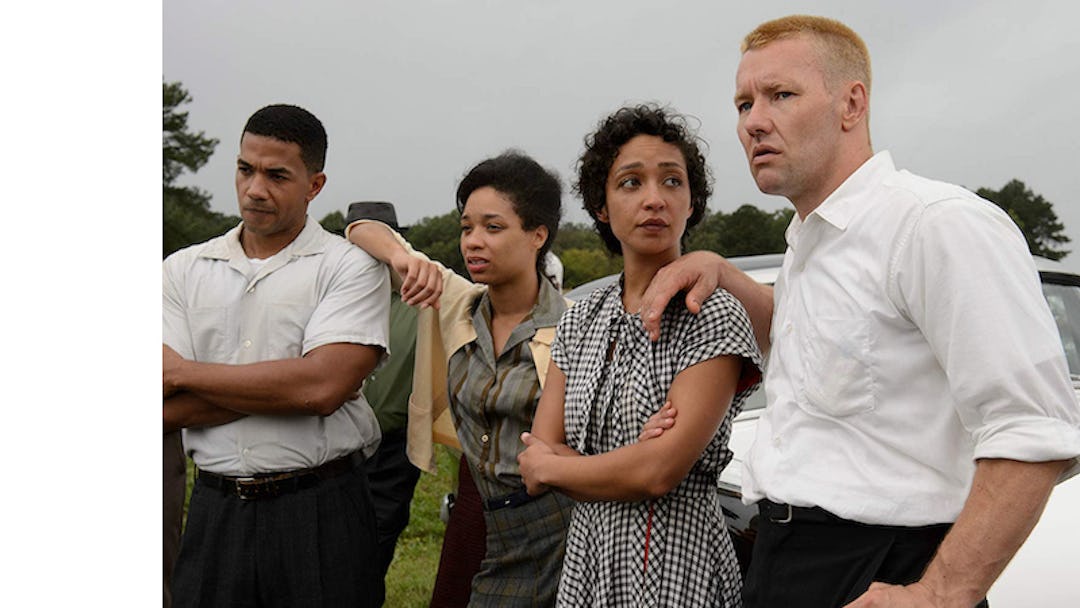There’s a certain kind of movie we’re used to seeing about landmark moments in our American struggle. Some of them are TV movies and some are not, but they all have the feel of one – big speeches, declarative conflicts, easy emotion, buttons pushed. But Jeff Nichols (Mud, Take Shelter) is not that kind of filmmaker, and Loving is not that kind of film. It’s based on a true story, the 1967 Supreme Court Loving v Virginia decision that lifted the prohibition of interracial marriage. It was a story about two people who literally changed our nation, but Nichols doesn’t approach them like that. He looks at them as two people who were in love, and wanted to live their lives together, and didn’t understand why it had to be such a big deal.
Nichols knows that they key to his film is to just tell their story, simply and directly, and let the other stuff take care of itself. He’s from the South, and approaches his films with a keen ear for the rhythms of country living. He takes his time in the opening scenes, even in the opening shot, of Mildred (Ruth Negga) telling Richard (Joel Edgerton) that she’s pregnant. That baby, who instigates their marriage but is not its sole sustenance, doesn’t arrive until nearly the one-hour mark. Nichols spends much of that first hour letting us settle into this region, and meet the people who populate it – specifically the Lovings, so we can understand who they are, and what they are together.
He knows, for example, that for non-confrontational types like these, it wouldn’t be a question of how people talk to them – it’s how they look at them. And how they look back; one of the most astute touches is how his actors don’t make eye contact with people in authority, lest they poke the bear. The Lovings weren’t agitators or activists, and they weren’t looking to start a fight. Nichols’s style is so modest, you might miss how vividly he captures the seductiveness, for those who fall sway to it, of racism – the way their sheriff sneers “It’s God’s law,” and is, in that moment, intoxicated by his presumption of superiority. (As the past few months had made clear, that is not an addiction confined to that era.)
Which is not to say that Loving is muted; it’s just that there is much to understand in what the two people, and especially Richard, choose to say and not say. As played by the beautifully understated Edgerton, Richard is a very specific type of rural man: one who works with his hands and who doesn’t talk all that much about what he’s feeling, but whose taciturn grunts can say more than reams of dialogue. There are scenes here where his face tells his entire story: the pleasure of quietly drawing up the plans to their house late into the night, his jolt of determination when he decides to get them a lawyer which gives way to the realization that he has no idea how to do that.
As their fight becomes more and more of a public one, Richard retreats and withdraws into himself, which nicely compliments the powerful character arc Nichols writes for Mildred, brought to disarming life by the extraordinary Negga. She’s initially inclined to accept whatever judgments are passed on them, but ultimately cannot abide being forced to live away from her family. There’s a bravura moment, when the phone call comes from the ACLU, when she realizes for the first time in her life that power is in her grasp, discovers the strength of that realization, and seizes it. After that moment, she begins to push back, with small acts, and then with easy dedication and resilience; this is a story about her finding her fight.
There’s a lovely pause in the second half, when the couple are visited by Grey Villett, a photographer from LIFE magazine played by a low-key Michael Shannon, who has appeared in every Nichols film to date. It’s telling that he pops up in that relatively brief role, but underlines the importance Nichols finds in that event – not just that the photos of the pair became such a part of their (and thus, the civil rights movement’s) iconography, but because they have such a warm, offhand intimacy that clearly informed his own approach to their story.
You see, Loving is a movie that’s quiet and lived-in, and because Nichols exhibits the patience he does throughout, the cumulative power of the final events is all the more overwhelming. And at the end, as their case is made in front of the Court, Nichols illustrates that argument with the images of a family sitting down at the dinner table. Something about that juxtaposition is overpowering, in a way that the most soaring oratory can’t approach. What a remarkable film this is.
Loving is out today in limited release.
